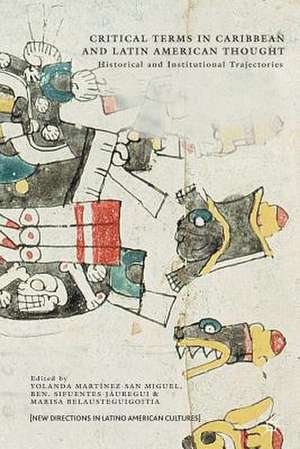Critical Terms in Caribbean and Latin American Thought: Historical and Institutional Trajectories: New Directions in Latino American Cultures
Editat de Yolanda Martínez-San Miguel, Ben. Sifuentes-Jáuregui, Marisa Belausteguigoitiaen Limba Engleză Paperback – 7 aug 2018
| Toate formatele și edițiile | Preț | Express |
|---|---|---|
| Paperback (1) | 270.95 lei 6-8 săpt. | |
| Palgrave Macmillan US – 7 aug 2018 | 270.95 lei 6-8 săpt. | |
| Hardback (1) | 732.52 lei 6-8 săpt. | |
| Palgrave Macmillan US – 17 noi 2015 | 732.52 lei 6-8 săpt. |
Din seria New Directions in Latino American Cultures
-
 Preț: 298.91 lei
Preț: 298.91 lei -
 Preț: 301.72 lei
Preț: 301.72 lei -
 Preț: 303.28 lei
Preț: 303.28 lei -
 Preț: 312.97 lei
Preț: 312.97 lei -
 Preț: 278.55 lei
Preț: 278.55 lei -
 Preț: 197.33 lei
Preț: 197.33 lei -
 Preț: 357.57 lei
Preț: 357.57 lei -
 Preț: 302.20 lei
Preț: 302.20 lei -
 Preț: 302.20 lei
Preț: 302.20 lei -
 Preț: 383.93 lei
Preț: 383.93 lei -
 Preț: 386.22 lei
Preț: 386.22 lei -
 Preț: 386.81 lei
Preț: 386.81 lei - 15%
 Preț: 693.57 lei
Preț: 693.57 lei -
 Preț: 385.62 lei
Preț: 385.62 lei -
 Preț: 389.70 lei
Preț: 389.70 lei -
 Preț: 379.09 lei
Preț: 379.09 lei -
 Preț: 380.63 lei
Preț: 380.63 lei -
 Preț: 414.30 lei
Preț: 414.30 lei - 15%
 Preț: 497.45 lei
Preț: 497.45 lei - 15%
 Preț: 635.29 lei
Preț: 635.29 lei -
 Preț: 387.38 lei
Preț: 387.38 lei -
 Preț: 379.09 lei
Preț: 379.09 lei -
 Preț: 387.75 lei
Preț: 387.75 lei - 15%
 Preț: 639.25 lei
Preț: 639.25 lei - 15%
 Preț: 581.98 lei
Preț: 581.98 lei - 15%
 Preț: 640.06 lei
Preț: 640.06 lei -
 Preț: 388.34 lei
Preț: 388.34 lei -
 Preț: 386.81 lei
Preț: 386.81 lei -
 Preț: 385.84 lei
Preț: 385.84 lei -
 Preț: 383.71 lei
Preț: 383.71 lei -
 Preț: 384.86 lei
Preț: 384.86 lei -
 Preț: 386.22 lei
Preț: 386.22 lei -
 Preț: 387.96 lei
Preț: 387.96 lei -
 Preț: 388.72 lei
Preț: 388.72 lei -
 Preț: 380.45 lei
Preț: 380.45 lei
Preț: 270.95 lei
Nou
Puncte Express: 406
Preț estimativ în valută:
51.85€ • 54.03$ • 42.93£
51.85€ • 54.03$ • 42.93£
Carte tipărită la comandă
Livrare economică 03-17 aprilie
Preluare comenzi: 021 569.72.76
Specificații
ISBN-13: 9781349557646
ISBN-10: 1349557641
Pagini: 299
Ilustrații: XII, 299 p.
Dimensiuni: 155 x 235 x 19 mm
Greutate: 0.44 kg
Ediția:1st ed. 2016
Editura: Palgrave Macmillan US
Colecția Palgrave Macmillan
Seria New Directions in Latino American Cultures
Locul publicării:New York, United States
ISBN-10: 1349557641
Pagini: 299
Ilustrații: XII, 299 p.
Dimensiuni: 155 x 235 x 19 mm
Greutate: 0.44 kg
Ediția:1st ed. 2016
Editura: Palgrave Macmillan US
Colecția Palgrave Macmillan
Seria New Directions in Latino American Cultures
Locul publicării:New York, United States
Cuprins
Introduction: The Latin American Keywords Project: A Critical Disciplinary Genealogy; Yolanda Martínez-San Miguel, Ben Sifuentes-Jáuregui, and Marisa Belausteguigoitia.- 1. Indigenism, Zapatismo and Indigeneidad: Listening to the Space of Silence; Marisa Belausteguigoitia.- 2. Indigenismo as Nationalism, From the Liberal to the Revolutionary Era; María Josefina Saldaña-Portillo.- 3. Americanism/o: Intercultural Border Zones in Post-social Times; Juan Poblete.- 4. Americanism/o and the Internalization of U.S. Imperialism: A Response to Juan Poblete; John Carlos Rowe.- 5. Colonialism, Postcolonial, Neocolonial, Internal Colonialism, Coloniality and Decoloniality; Nelson Maldonado Torres.- 6. Mapping Colonial Resistance: Colonialism, Anti- '' ''Indianism, '' '' and Nationalism in the Americas; Leece Lee-Oliver.- 7. Criollismo, Creole and Créolité; José Antonio Mazzotti.- 8. Creole, Criollismo and Créolité; H. Adlai Murdoch.- 9. Race and the Constitutive Inequality of the Modern/Colonial Condition; José Buscaglia-Salgado.- 10. The Asian Presence in Mestizo Nations: A Response; Kathleen López.- 11. Transculturation, Syncretism, and Hibridity; Jossianna Arroyo.- 12. The Persistence of Racism in Critical Imaginaries on Latin America; Laura Catelli.- 13. Modernity and Modernization: the Geopolitical Relocation of Latin America; Graciela Montaldo.- 14. Beyond Modernity; Alejandra Laera.- 15. The Latin America Nation and its Cultural Inscriptions: Archives of Promise or Lament?; Román de la Campa.- 16. Multiplicity and its Discontents: A Response to Román de la Campa; Héctor Hoyos.- 17. Gender/Género in Latin America; Lawrence La Fountain-Stokes.- 18. Gender Travels South: Response to Lawrence La Fountain-Stokes; Montserrat Sagot.- 19. Queer/Sexualities; Licia Fiol Matta.- 20. Queer Articulations; Carlos Figari.- 21. Testimonio: The Witness, the Truth and the Inaudible; Ana Forcinito.- 22. Enunciating Alleged Truths: A Response to Ana Forcinito; Arturo Arias.- 23. Lo popular/ Popular Culture: Performing the Borders of Power and Resistance; Ignacio M. Sánchez Prado.- 24. Globalized Digital Popular Cultures: A Response to Ignacio Sánchez Prado; Susan Antebi.
Notă biografică
Yolanda Martínez-San Miguel is Professor of Latino and Hispanic Caribbean Studies and Comparative Literature at Rutgers University-New Brunswick, USA. She is author of From Lack to Excess: 'Minor' Readings of Colonial Latin American Literature and Coloniality of Diasporas: Rethinking Intra-colonial Migrations in a Pan Caribbean Context.
Ben. Sifuentes-Jáuregui is Associate Professor of American Studies and Comparative Literature at Rutgers University-New Brunswick, USA. He is author of Transvestism, Masculinity, and Latin American Literature and The Avowal of Difference: Queer Latino American Narratives.
Marisa Belausteguigoitia is Professor of Gender/Cultural Studies and Education at the School of Humanities at the National Autonomous University of México (UNAM). She is author with María Josefina Saldaña-Portillo of Des/posesión: Género y territorio y luchas por la autodeterminación.
Ben. Sifuentes-Jáuregui is Associate Professor of American Studies and Comparative Literature at Rutgers University-New Brunswick, USA. He is author of Transvestism, Masculinity, and Latin American Literature and The Avowal of Difference: Queer Latino American Narratives.
Marisa Belausteguigoitia is Professor of Gender/Cultural Studies and Education at the School of Humanities at the National Autonomous University of México (UNAM). She is author with María Josefina Saldaña-Portillo of Des/posesión: Género y territorio y luchas por la autodeterminación.
Caracteristici
Explores the cultural and critical translation of key terms in Caribbean and Latin American Studies from English to Spanish using experiences in the classroom as a point of departure Unpacks moments of misunderstanding and misreading in which critical terms circulate as disciplinary cognates yet become particularly untranslatable as a result of their different origins and genealogies Resists the simplification that the validation of scholarship produced in the native languages of Caribbean and Latin American scholars are more authentic than research produced elsewhere Promotes more open communication, play, and exchange of ideas between US-centered debates, as well as conversations, frameworks, and debates central to Latin America and the Caribbean













